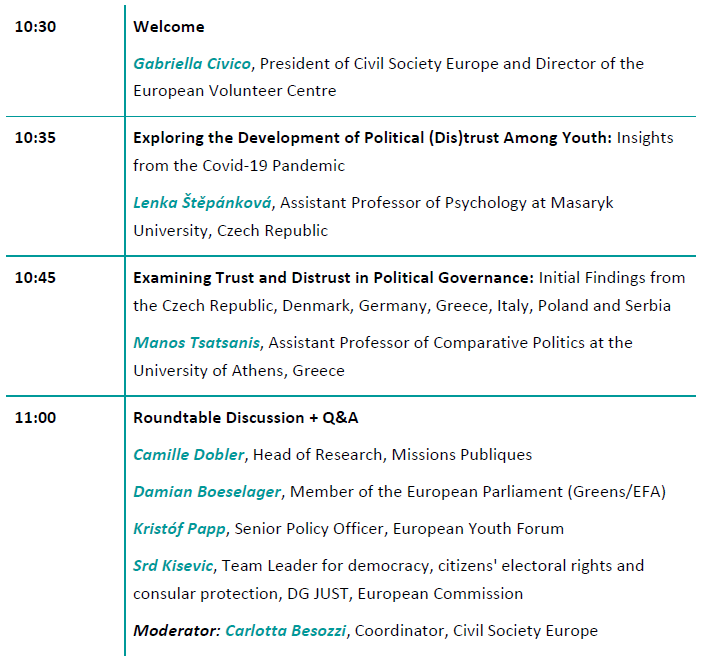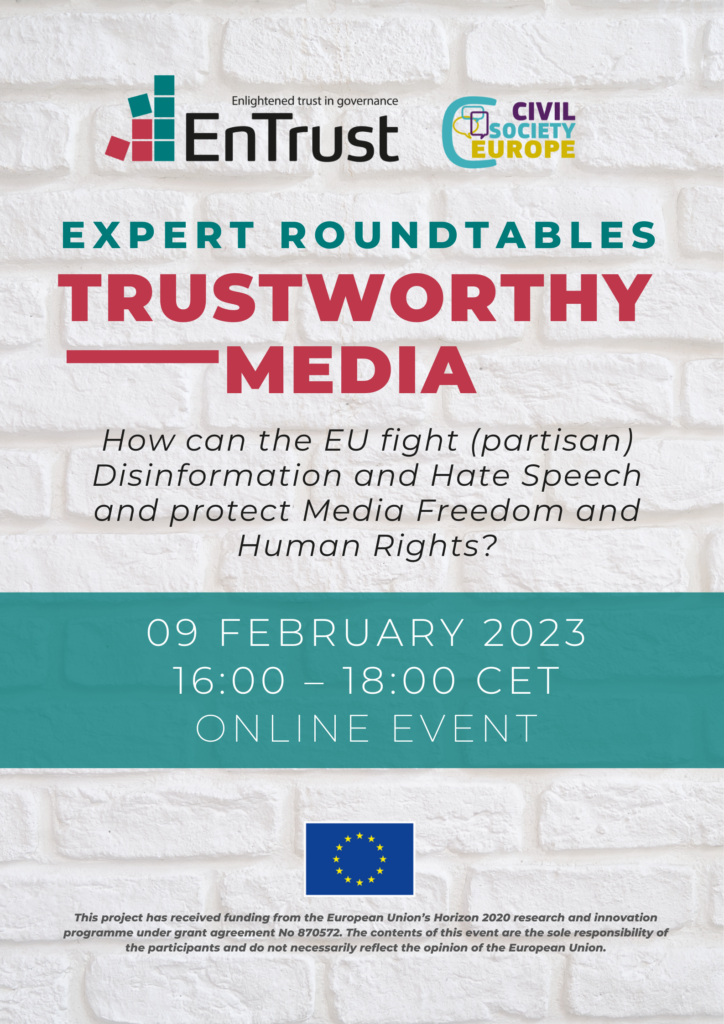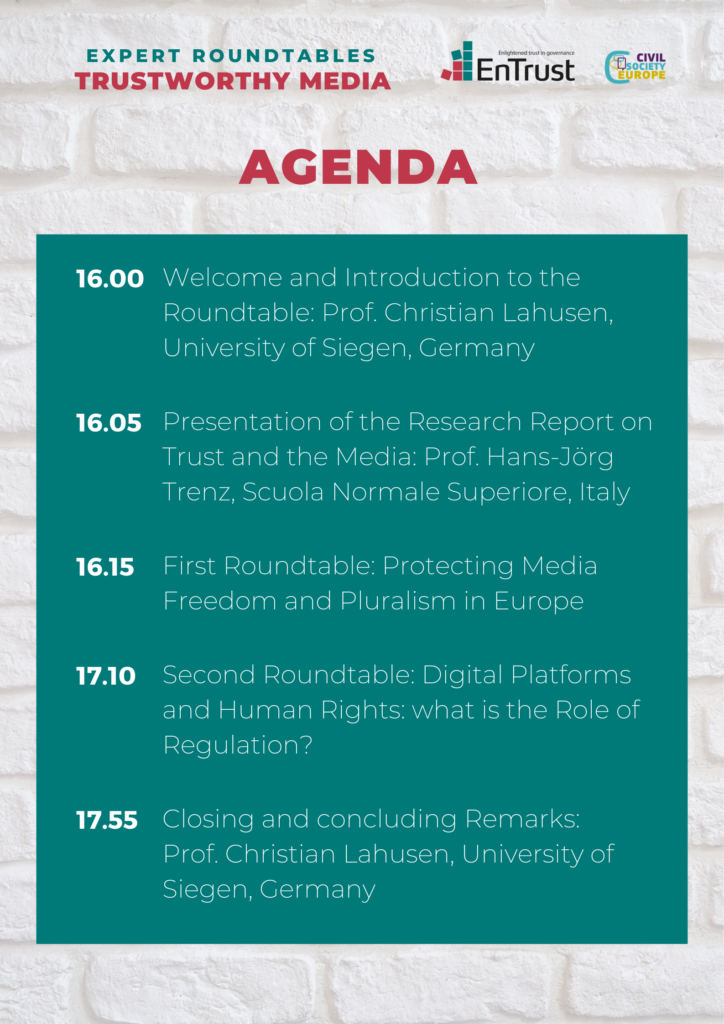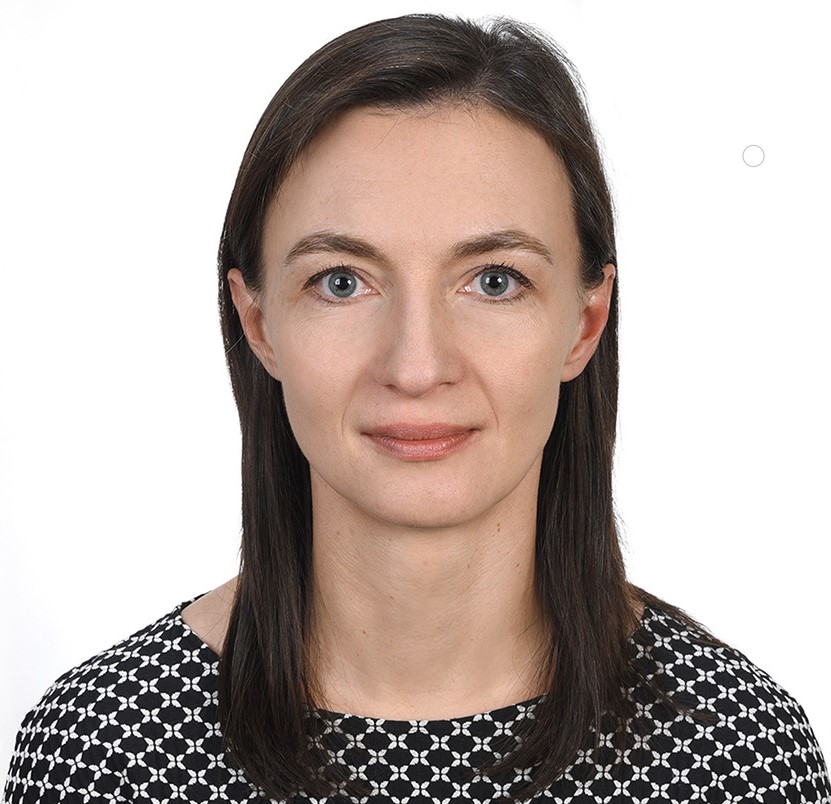Our latest European Policy Briefs provide evidence-based policy recommendations and new insights about dis/trust contestation and building in the media and the role of disinformation and media freedom (European Policy Brief IV) and regarding the formation of (political) trust and distrust throughout different life stages, thus accounting for the developmental-psychological foundations of trust in governance (European Policy Brief V).
Author: Ulrike Zschache
A Europe We Trust: visions of European youth
Are you a young person aged 13 – 19 and living in Europe? Do you have a vision for the future of Europe that you would like to share?
If so, take part in EnTrust’s creative contest, ‘A Europe We Trust: visions of European youth’.
What can I submit?
We accept submissions in a visual format – this could be a drawing, painting or photograph that represents your vision. If a visual submission is not accessible to you, we also accept written submissions like essays or opinion pieces.
What is the prize?
Winners will be invited to Brussels in January 2024 to attend an awards ceremony and visit the EU institutions.
What should my submission be about?
Your submission should be based on your vision for the future of Europe. You can use one or more of the below topics as inspiration:
- Equality, Inclusiveness and Accessibility: How do you envision a more equal, inclusive and accessible Europe for young people?
- Youth Participation, Representation and Open Dialogue in the EU: What would Europe look like with a more active role for young people in decision-making?
- Sustainability, Climate Action and Empowerment of Rural Youth: How do you envision a future Europe in which all young people have a role in climate action and sustainability?
- Mental Health and Wellbeing: What would Europe look like if it placed greater importance on mental health and wellbeing?
- Access to Employment, Fair Working Conditions and a Living Wage: What would Europe be like if all young people could access the labour market, have fair working conditions and be paid a living wage?
Who can enter?
The contest is open to young people residing in any of the 27 EU Member States as well as EU candidate countries. You can enter either as an individual or in a group. Three winners will be selected and announced in November 2023.
The deadline for submissions is 31st October at 17:00 CET.
For more information about the submission guidelines and process, please consult the contest website. Feel free to email info@civilsocietyeurope.eu with any questions.
Watch a short video clip about the contest here:
For our International Conference “Trust and Distrust in Governance: Exploring the Impact of Social and Political Dynamics” at the University of Siena (Italy) from 28-29 September 2023, registration for conference observation is now open. Please register by sending an email to entrust@uni-siegen.de by 15 September 2023.
You may find more detailled information about the conference here.
Trust and Distrust in Governance: Exploring the Impact of Social and Political Dynamics
International Conference organised by the EU-funded EnTrust project
September 28-29, 2023 – University of Siena, Italy
Find the updated conference programme here.
Trust in governance is considered a pivotal element for democracy. In light of multiple and interrelated crises of recent years an increase of distrust in governance came to the fore and became a highly debated issue, both within the public and the academic field. At the same time, however, scepticism and distrust themselves are productive elements within the democratic arena, as it is a key role of democratic citizens or social movements to critically scrutinise the actions and decisions of governmental actors. This indicates a complex interrelation between trust and distrust, the factors that are responsible for these interrelations, and the ways how trust and distrust need to be evaluated. All these issues contribute to puzzling questions that still await clarification.
The processes of the construction of dis/trust take place on different levels (such as the local, national, European) and involve the individual citizens, collective actors such as social movements and political parties, political institutions, and public spheres. To unfold the dynamics of dis/trust and their consequences for democracy it is therefore indispensable to consider a variety of factors. These include socio-economic, political, cultural, and psychological aspects on the individual level, but also reciprocal relations and practices between citizens and various governance actors, political contestations and public debates on the collective level. Likewise, the heterogenous historical legacies or cultural contexts of (European) nations and regions need to be taken into account.
The conference takes up the overarching topic of trust and distrust in democratic governments and institutions and aspires to explore it in all its various dimensions and aspects.
We invite you to register as an observer to the conference. Please send an email to entrust@uni-siegen.de by September 15, 2023.
– PRELIMINARY CONFERENCE PROGRAMME –
September 28, Thursday
08:30 – 09:00 | Registration
09:00 – 09:30 | Welcome / Opening Remarks
09:30 – 11:00 | Paper Presentations: Parallel Session (1 & 2)
Session One: The Realm of Bureaucracy, Local Institutions and the Creation of Dis/Trust
Session Two: The European Union as a Source and Target of Trust and Distrust
11:00 – 11:30 | Coffee Break
11:30 – 13:00 | Paper Presentations: Parallel Session (3 & 4)
Session Three: Science, Expert Knowledge, and the Complex Landscape of Trust
Session Four: Regulatory Agencies and Processes of Trust
13:00 – 14:00 | Lunch
14:00 – 15:30 | Paper Presentations: Parallel Session (5 & 6)
Session Five: Trust and Distrust in the Context of Migration and Refugees
Session Six: Perspectives on Childhood and Adolescence
15:30 – 16:00 | Coffee Break
16:00 – 17:30 | Paper Presentations: Parallel Session (7 & 8)
Session Seven: Trust in Transition: Lifespan Dynamics
Session Eight: Navigating Trust and Distrust in the Era of the COVID-19 Pandemic
17:30 – 18:30 | Keynote by Pippa Norris (Harvard University): “Trust in Government Worldwide: The Role of Information Environments and Cognitive Skills” (Virtual Presentation)
19:30 | Joint Dinner
September 29, Friday
09:00 – 10:00 | Keynote by Tereza Capelos (University of Birmingham): “Hot Emotionality and the Fracture of Trust in the Era of Grievance Politics”
10:00 – 10.30 | Coffee Break
10:30 – 12:30 | Paper Presentations: Parallel Session (9 & 10)
Session Nine: Protest, Political Contestation, and the Formation of Dis/Trust
Session Ten: Trust under Siege: Populism and Authoritarian Tendencies
12:30 – 13:30 | Lunch
13:30 – 14:30 | Keynote by Martin Hartmann (University of Lucerne): “The Conflictual Potential of Trust. Introducing a New Perspective”
14:30 – 16:00 | Paper Presentations: Parallel Session (11 & 12)
Session Eleven: The Role of Media and Social Networks in Dis/Trust Contestations
Session Twelve: Public Deliberations, Participatory Citizenship and Institutional Trust
16:00 | Closing Colloquy: Project Presentations, Posters and Coffee Chats
Tracing (Dis)Trust in the Run Up to the European Elections: Adult and Youth Attitudes towards Governments and Institutions
28 June 2023 | 10:30 – 12:00 CET | Online

Join us for this roundtable discussion that delves into the attitudes of youth and adults towards governments and institutions at different levels of governance, with a specific focus on the topics of trust and distrust.
With the European Elections 2024 on the horizon and millions of young people prepared to cast their votes for the very first time, restoring and strengthening public trust in our political institutions has once again emerged as a key priority on the political agenda. The EnTrust research project offers an innovative approach to understanding and addressing (dis)trust in governance, providing valuable insights and measures to support democratic societies in Europe. One objective of the project is to elucidate the significance of political (dis)trust among young people and delve into its developmental process. A notable illustration of this is the emergence and expression of (dis)trust in political institutions amidst the backdrop of the Covid-19 pandemic. Moreover, the project conducted large-scale surveys in seven European countries to gather the opinions of citizens and residents regarding (dis)trust towards various levels of governance, especially during challenging economic times. Of particular interest were country variations, political orientations, views on European integration, and other relevant characteristics.
The roundtable discussion will include two presentations of exclusive preliminary research findings related to the topics addressed above, offering decision-makers and stakeholders valuable evidence to (re)build trust in both national and EU governance. Experts from EU institutions and civil society will provide commentary on the findings, sharing insights into the significance of trust in their respective fields of work. Other participants will be invited to intervene and ask questions to further enrich the discussion.
PLEASE REGISTER HERE.
Agenda:

In its European Policy Briefs, EnTrust addresses main findings of our research and provides evidence-based policy recommendations with regard to current policy debates relating to trust and distrust in governance, civil society, public spheres and the future of democracy in Europe. Lately, our European Policy Briefs dealt with dis/trust in direct relations between citizens and social welfare institutions and the role of democratic social movements in the formation of dis/trust in governance. All our European Policy Briefs are published in English and in the seven languages of our consortium. You may find them here.
Trust and Distrust in Governance: Exploring the Impact of Social and Political Dynamics
International Conference organised by the EU-funded EnTrust project
September 28-29, 2023 – Siena, Italy
Abstract Submission Deadline: April 07, 2023
Find the full Call for Papers here.
Trust in governance is considered a pivotal element for democracy. In light of multiple and interrelated crises of recent years an increase of distrust in governance came to the fore and became a highly debated issue, both within the public and the academic field. At the same time, however, scepticism and distrust themselves are productive elements within the democratic arena, as it is a key role of democratic citizens or social movements to critically scrutinise the actions and decisions of governmental actors. This indicates a complex interrelation between trust and distrust, the factors that are responsible for these interrelations, and the ways how trust and distrust need to be evaluated. All these issues contribute to puzzling questions that still await clarification.
The processes of the construction of dis/trust take place on different levels (such as the local, national, European) and involve the individual citizens, collective actors such as social movements and political parties, political institutions, and public spheres. To unfold the dynamics of dis/trust and their consequences for democracy it is therefore indispensable to consider a variety of factors. These include socio-economic, political, cultural, and psychological aspects on the individual level, but also reciprocal relations and practices between citizens and various governance actors, political contestations and public debates on the collective level. Likewise, the heterogenous historical legacies or cultural contexts of (European) nations and regions need to be taken into account.
The conference takes up the overarching topic of trust and distrust in democratic governments and institutions and aspires to explore it in all its various dimensions and aspects.
The Realm of Bureaucracy and the Creation of Dis/Trust
Possible topics are, among others, the interplay between citizens and public authorities and how these shape the processes of dis/trust building, the role and the shape of the (welfare) state as well as the citizens’ perceptions and opinions about institutional services and institutions, dis/trust building in the context of vulnerable groups (such as disadvantaged families or social welfare users)
Protest, Political Contestation, and the Formation of Trust and Distrust
The role of collective protest and social movements in the creation of dis/trust in governance can be expected to be significant. It needs to be considered in which ways democratic social movements canalise and mobilise forms of distrust within the general public in order to achieve policy changes. Those practices need to be focused that create, challenge, or reproduce trust and distrust relationships.
The Role of the Media in Dis/Trust Contestations
The media plays a key role in the mediation between governance, scientific expertise, and citizens. Various issues can be addressed, such as dis/trust of citizens in journalism and news sources as well as the processes of how dis/trust is constructed in and through the media, the impact of different media technologies on dis/trust relations, dis/trust in times of “fake news” and “alternative facts”.
Dynamics of Individual Trust and Distrust in Governance
In order to understand processes of trust and distrust in governance, individual factors as well as underlying psychological sources and patterns need to be considered. For example, analyses might focus on the developmental changes in individual perceptions of dis/trust and the influences of everyday experiences on trust and distrust, as well as on factors responsible for the formation and change of trust related attitudes, among them political radicalisation and extremism.
Public Deliberations, Political Decision-Making, and Institutional Trust
Individual and collective trust and distrust in governance is strongly conditioned by the functioning of political institutions and the way democratic representation, accountability and participation is organised. It is thus of relevance to analyse the ways in which deliberative forums, public consultations and other participative forms of decision-making influence – next to institutional procedures of policy-making and implementation – dis/trust relationships, on the domestic or European level.
Scope and Aims
During the two-day conference two distinguished experts, Pippa Norris (Harvard University) and Tereza Capelos (University of Birmingham), will hold keynote speeches. Additionally, different panels will be held to present and discuss ongoing research on the various topics and questions identified above.
Please note, that the conference will be organised as an in-person event. After years of online-meetings and conferences because of the Covid pandemic, we very much look forward to interacting with colleagues face-to-face and to reinforce and rebuild links in the community.
We envision the conference to be an inclusive platform, where findings and discussions of the EnTrust project are brought into dialogue with the work of a variety of researchers with different backgrounds. By means of an interactive debate and lively exchange, we hope to gain further insights into different arenas of trust formation as well as into the forms, conditions and implications of trust and distrust in democratic governance. With respect to the composition and aim of the EnTrust project, the conference will strive to combine insights from sociology, psychology, political sciences, and media studies.
Paper Submissions
Researchers from all disciplines indicated above are invited to submit abstracts for talks as of now. We are particularly interested in empirical-driven proposals using a quantitative, qualitative or mixed methods approach.
To submit a paper proposal, we ask for title and abstract (300 words maximum). All abstracts must be written in English. All proposals should be submitted by April 07, 2023. Acceptance mails will be sent by May 06, 2023.
It is an option to participate in a conference poster session as well. The poster session will provide an opportunity for those authors who cannot be considered for a talk. Instead, they will be able to present and discuss the results and conclusions of their papers in small groups. Please indicate in your submission, whether you are interested in this option.
Submissions from young scholars are highly welcomed as well. We can provide a limited number of travel fellowships for (junior) scholars with lack of funding support.
Contact:
Please send your submission to entrust@uni-siegen.de
For more information about the EnTrust research network and their more than 30 researchers: https://entrust-project.eu
How can the EU fight (partisan) Disinformation and Hate Speech and protect Media Freedom and Human Rights?
The EnTrust project invites you to online expert roundtables about trustworthy media on 9 February 2023 from 16:00 to 18:00 (CET) with selected stakeholders from European governance institutions, media organisations, civil society and academia.
In the last years, the relationship between the media and trust in democratic institutions has received increasingly attention. Media freedom and pluralism are seen in danger, sometimes caused by governmental control over media outlets. Regulations such as the European Media Freedom Act are being developed to protect editorial independence and make media ownership and concentration more transparent. At the same time, concerns over the dangers of digital platforms for human rights and democracies have become more nuanced, accompanied by instruments such as the European Democracy Action plan, the Code of Practice on Disinformation, and the Digital Services Act. Calls for a stronger regulation of social media and a human rights-based approach to content moderation have grown louder.
In two roundtables, we talk with our panellists about issues, legal instruments, and recommendations in the context of media freedom and human rights on digital platforms. Other participants will have the opportunity to contribute their own views and ask questions to the panellists. The roundtables will be preceded by the presentation of research from the EnTrust project on the role of media in the building of trust and distrust in governance.
You may find the full agenda of the online event here.
PLEASE REGISTER HERE.
Agenda:
- Welcome and introduction by:
Prof. Christian Lahusen, University of Siegen, Germany
- Presentation of the Research Report on Trust and the Media:
Prof. Hans-Jörg Trenz, Scuola Normale Superiore, Italy
- First Roundtable: Protecting Media Freedom and Pluralism in Europe
Barbora Bukovská, Senior Director for Law and Policy, Article 19
Artemiza-Tatiana Chisca, Head of the Media and Internet Division, Council of Europe
Audrius Perkauskas, Deputy Head of Unit at the European Commission, Audiovisual and Media Services Policy (CNECT.I.1)
Renate Schroeder, Director, European Federation of Journalists
Moderated by Alexandrina Najmowicz, Secretary General, European Civic Forum
- Second Roundtable: Digital Platforms and Human Rights: what is the Role of Regulation?
Marie-Hélène Boulanger, Head of Unit at the European Commission, Union Citizenship Rights and Free Movement (JUST.D.3)
Jan Penfrat, Senior Policy Advisor, European Digital Rights
Alberto Rabbachin, Deputy Head of Unit at the European Commission, Media Convergence and Social Media (CNECT.I.4)
Moderated by Marlena Wisniak, Senior Legal Consultant, European Center for Not-for-Profit Law
- Closing and concluding Remarks:
Prof. Christian Lahusen, University of Siegen, Germany


“Social movements as Alternative Arenas of Political participation: Mobilising Citizens in the Re-creation of Trust and Distrust”
The EnTrust project invites you to an online roundtable event on 20 June 2022 from 16:00 to 17:30 (CET) with selected stakeholders from national and EU-level governance institutions, civil society and academia. Participants will discuss findings from the EnTrust project’s Integrated Report on the Role of Democratic Social movements, dealing with the role that social movements, as alternative arenas of political participation, could have in creating and reproducing trust and distrust. The report gathered information on the interaction and possible interplay between two recent and growing trends: citizens’ withdrawal from institutional political arenas and the rise of contemporary contentious politics manifested as increased participation of citizens in new social movement practices in the following countries: Czech Republic, Denmark, Germany, Greece, Italy, Poland and Serbia, covering diverse mobilisations on democracy, environment, right to housing, rights of women and of minorities. The report provides better understanding of the social movements’ alternative visions of Europe – as a political and social space – and alternative ways of (re)building trust in its institutions. We also gathered insights into the way these social movements interrelate with more established mainstream civil society organisations (CSOs) and political parties and about their understanding of democracy.
The Expert roundtable will look into the relationship between mistrust in governance and collective mobilisation through social movements, as well as on the effects of social movements on trust-building. The rise of new social movements that mistrust institutional politics, but develop critical, enlightened trust through alternative conceptions of democracy and democratic spaces, in fact could be seen as an answer to the problem of the decline of political trust found in contemporary democracies. This debate is particularly timely in the context of the rise of new social movements within the political, social and environmental crisis that Europe is facing, and in the perspective of the conclusions of the Conference on the Future of Europe and debates on increasing citizen’s participation.
If you wish to participate in this event, please register directly here.
—————————————————————————————————
Agenda:
- Welcome and introduction to the roundtable by:
Prof. Christian Lahusen, University of Siegen, Germany
- Presentation of the report on the role of democratic social movements in the formation of trust and distrust:
Irena Fiket, Institute of Philosophy and Social Theory of the University of Belgrade, Serbia
- Panel Discussion with:
Helmut Scholz, Member of the European Parliament, Observer to the Executive Board of the Conference on the Future of Europe
Anelia Stefanova, Energy Transformation Strategic Leader, CEE Bankwatch Network, Bankwatch CEE
Gordana Rammert, Council Member of the City of Bielefeld, CoR Young Elected Politicians Programme
Adrien Licha, Coordinator of the Brussels Office of ALDA, the European Association for Local Democracy
Alexandrina Najmowicz, Secretary General of the European Civic Forum
Gazela Pudar Draško, Institute of Philosophy and Social Theory of the University of Belgrade, Serbia
Moderated by Carlotta Besozzi, Coordinator of Civil Society Europe
- Closing and final discussion on lessons to be drawn:
Prof. Christian Lahusen, University of Siegen, Germany

On 10 December 2021, EnTrust will hold an online expert meeting with selected stakeholders from public services, civil society and academia. Participants will discuss first findings from the EnTrust project on the mechanisms of building trust and distrust in relations between citizens and street-level bureaucracy in the area of support to disadvantaged families. In particular, they will address fresh insights from EnTrust research about how both public administration representatives and citizens who contact them when applying for family benefits or services establish their mutual attitudes of trust and distrust, and the reciprocal perceptions of un/trustworthiness at play. A special focus will be on practical and policy recommendations from the practitioners’ perspective. The debate will be opened with an introduction by the work package leader Maria Theiss, who will present key results from the analysis of individual in-depth interviews with frontline workers of social welfare institutions and citizens receiving social assistance in diverse countries such as the Czech Republic, Denmark, Germany, Greece, Italy, Poland and Serbia.

Institute of Social Policy
